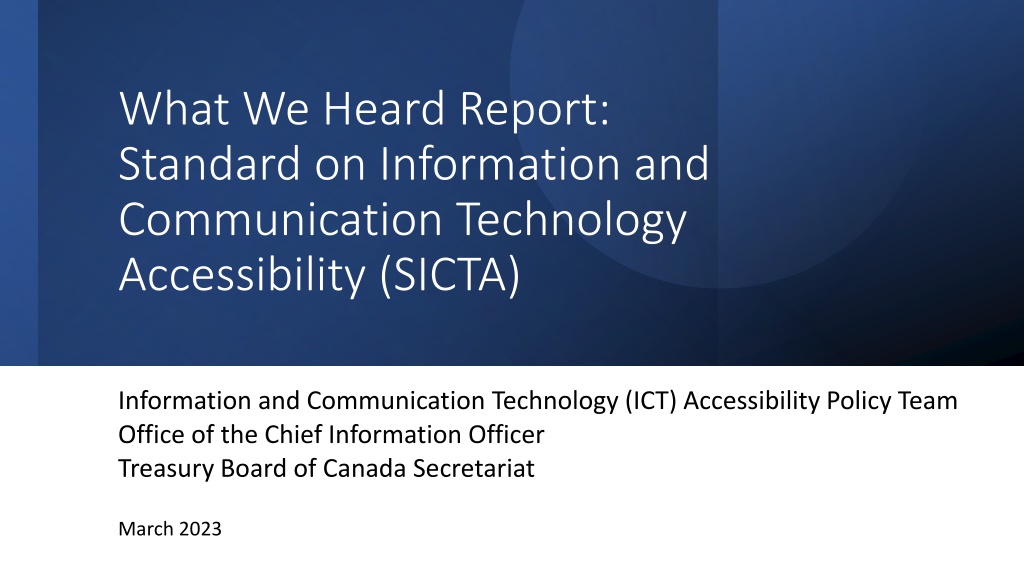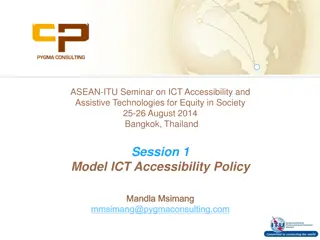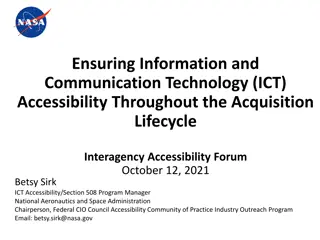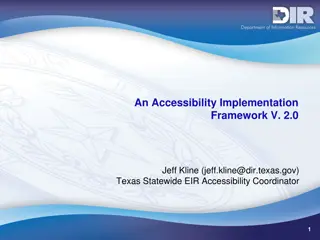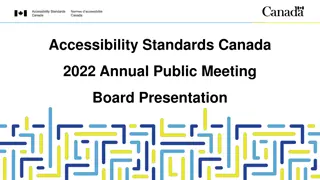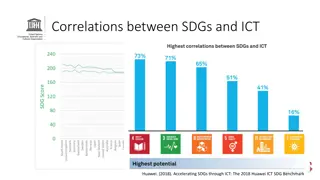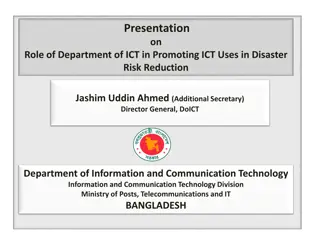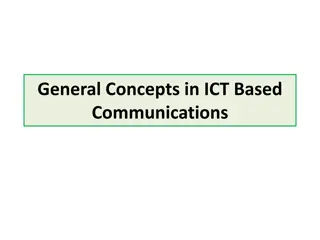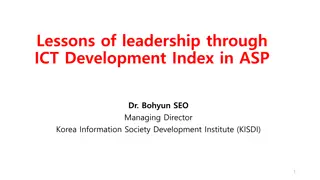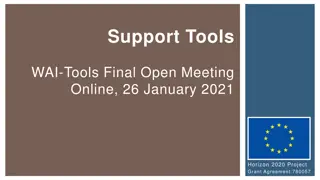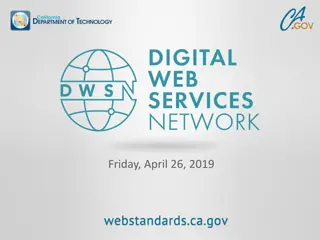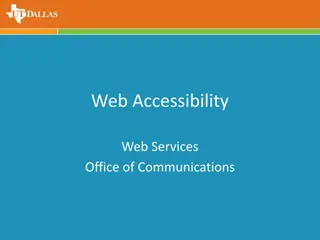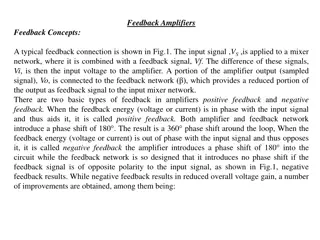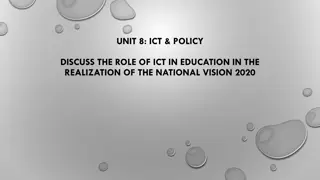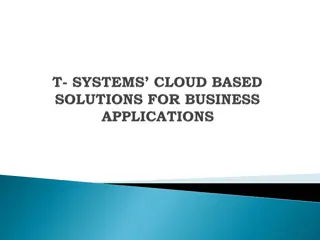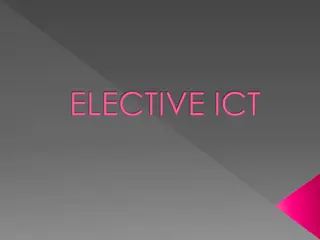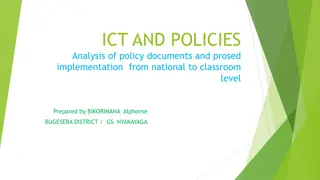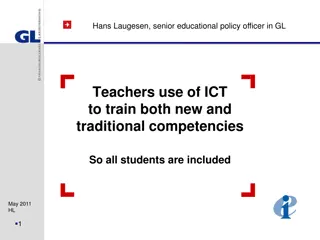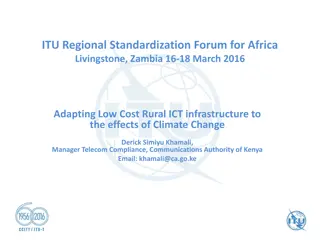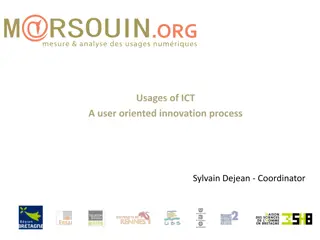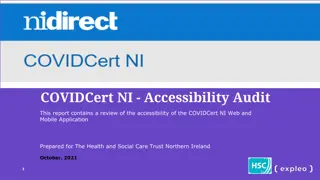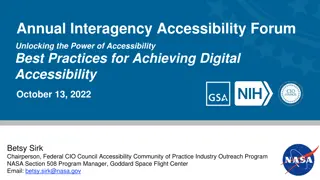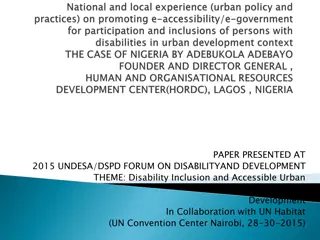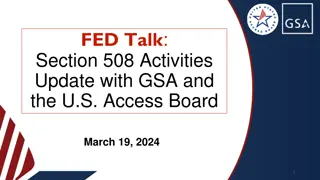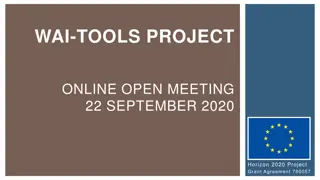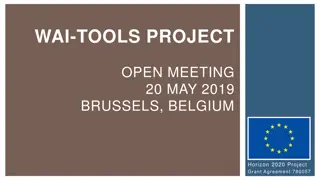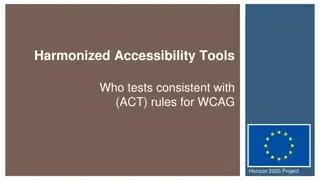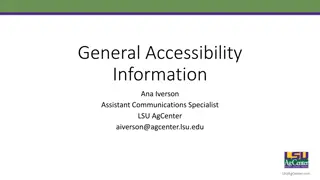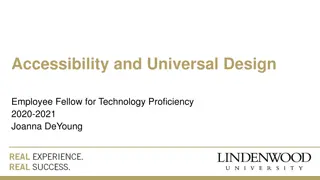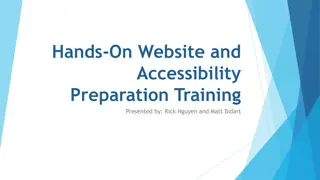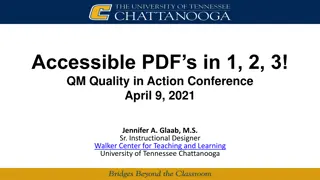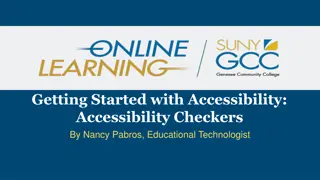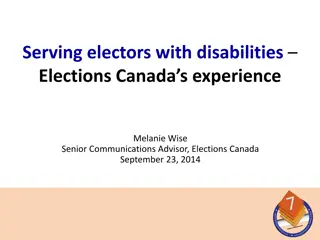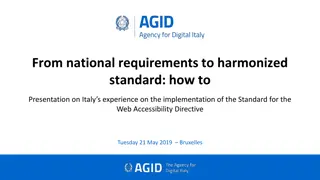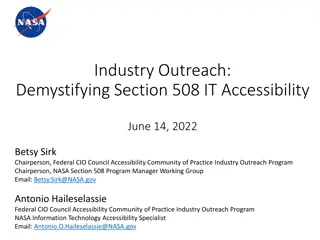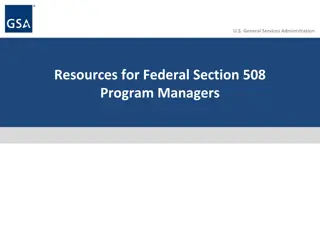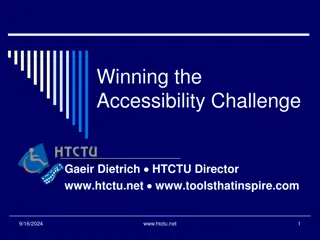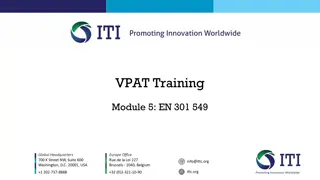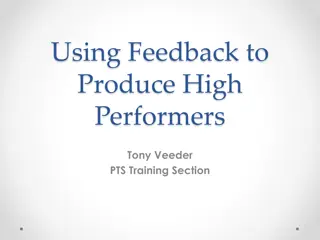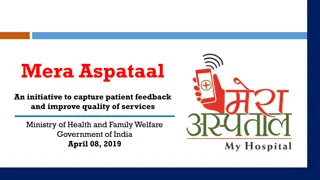Feedback Summary on Standard for ICT Accessibility in Canada
The report presents insights and feedback gathered from a targeted engagement on the Standard on Information and Communication Technology (ICT) Accessibility in Canada. It outlines key themes, points of feedback, and steps taken to address them. This initiative aims to enhance accessibility standards for ICT in the Government of Canada, supporting inclusivity and usability for all individuals.
Download Presentation

Please find below an Image/Link to download the presentation.
The content on the website is provided AS IS for your information and personal use only. It may not be sold, licensed, or shared on other websites without obtaining consent from the author. Download presentation by click this link. If you encounter any issues during the download, it is possible that the publisher has removed the file from their server.
E N D
Presentation Transcript
UNCLASSIFIED / NON CLASSIFI What We Heard Report: Standard on Information and Communication Technology Accessibility (SICTA) Information and Communication Technology (ICT) Accessibility Policy Team Office of the Chief Information Officer Treasury Board of Canada Secretariat March 2023
UNCLASSIFIED / NON CLASSIFI Purpose of this Deck Purpose of this Deck Between October 31 and November 30, 2022, the TBS-OCIO Digital Policy & Performance Division undertook a targeted engagement on the Standard on Information and Communication Technology (ICT) Accessibility This deck provides a summary of the key themes and points of feedback from the engagement, as well as steps taken by TBS to address them. Participant feedback has been instrumental in the further development of the standard, and this deck represents an opportunity to share some of it with our industry partners and the GC community.
UNCLASSIFIED / NON CLASSIFI Context The Standard on ICT Accessibility will come into effect under the Policy on Service and Digital in Summer 2023, replacing the Standard on Web Accessibility The main objective of this engagement was to gather feedback, insights, and comments on phase one of the Standard on ICT Accessibility, while identifying potential gaps The Standard on ICT Accessibility contains requirements for making all ICT that is developed, procured, or owned by the GC accessible. Consistent with the Policy and Directive on Service and Digital and leading practices from other jurisdictions (EN 301 549 v3.2.1). Operationalizes the principle of nothing without us Builds on lessons learned
UNCLASSIFIED / NON CLASSIFI The purpose of the Standard on ICT Accessibility is to identify, remove and prevent ICT accessibility barriers across the GC and support the third pillar in the accessibility strategy for the Public Service of Canada to make ICT usable by all. Purpose of the Standard 4
UNCLASSIFIED / NON CLASSIFI Consultation Engagement Summary Consultation Engagement Summary Targeted engagement on Phase One of the draft Standard on ICT Accessibility were held between October 31 November 30, 2022 Key stakeholder communities including GC partners, accessibility subject-matter experts, Persons with Disabilities Networks, relevant policy centers, EDI Networks, and select external industry partners were consulted An inclusive engagement approach was applied to engage traditional and non-traditional partners through a combination of targeted communication, bilateral discussions, cross- sectoral meetings, and leveraging existing foras. This resulted in higher level of engagement from stakeholders with a wide range of expertise, knowledge, and experience. To allow for flexibility, stakeholders were invited to submit feedback through MS form, email and online (via GitHub): o Approximately 85 responses and 510 unique comments were received
UNCLASSIFIED / NON CLASSIFI Simplify the Effective date and deadline for compliance Themes from Commentary include: Official Language requirements Supporting guidance is essential for departments to understand and implement the standard requirements Accessibility as an ongoing commitment for the GC
UNCLASSIFIED / NON CLASSIFI Theme 1: Theme 1: Simplify the effective date and deadline Simplify the effective date and deadline for for compliance compliance Feedback: Respondents indicated that the effective date should be included in the standardso that they don t have go back and forth to look for the timelines and the associated requirements. Respondents also noted the current format effective date + x month can be confusing to them. Conformance timelines should be stated clearly. How we adapted: The subsection on compliance timelines was removed and compliance dates were incorporated directly into the requirements.
UNCLASSIFIED / NON CLASSIFI Theme 2: Official Language requirements Theme 2: Official Language requirements Feedback: Respondents commented that the EN 301 549 standard is only published in English, which is not accessible to them, and it goes against the spirit of the Official Languages Act. If we want to keep referring to the EN 301 549 in the Standard on ICT Accessibility, we must ensure that there is a French version of the EN 301 549 available as well. How we adapted: TBS-OCIO will be publishing the EN 301 549 requirements in both official languages.
UNCLASSIFIED / NON CLASSIFI departments to requirements Theme 3: Supporting guidance is essential for Theme 3: Supporting guidance is essential for departments to understand and implement the standard understand and implement the standard requirements Feedback: Respondents commented that the EN 301 549 standard is too technical to comprehend and was not written in plain language, including clearer definitions. Respondents inquired about the details regarding accessibility training, tools and conformance testing. How we adapted: Implementation guidance will also be published in plain language to better support departments understand the requirements in the EN 301 549 and successfully implement phase one. Definitions has been removed in the final version of the standard and will instead be featured in the standard guidance that will follow.
UNCLASSIFIED / NON CLASSIFI Theme 4: Accessibility as an ongoing commitment for the Theme 4: Accessibility as an ongoing commitment for the GC GC Feedback: Respondents noted our requirements could go further and we could be doing more (especially as it relates to non-web documents). How we adapted: Previously we had a single requirement that required departments to provide existing non-web documents when requested. We've since added two additional requirements to be more proactive in accessibility of the GC's non-web document, which read: All new external-facing non-web documents that are produced from a word processing software, spreadsheets, presentations or Portable Document Format (PDF) files in a native digital format after summer 2024, must be accessible in conformance with the EN 301 549 V3.2.1; All base templates of non-web documents that are produced from a word processing software, spreadsheets, presentations or Portable Document Format (PDF) files in a native digital format and owned by the GC organisation must conform with the EN 301 549 V3.2.1
UNCLASSIFIED / NON CLASSIFI Next Steps Next Steps Obtain required approvals for the standard through OCIO policy stewardship process (Summer 2023) Publish Phase 1 of the Standard on ICT Accessibility (Summer 2023) Publish official standard guidance (Summer 2023)
